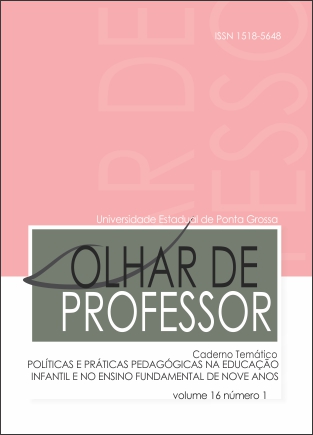Exigência conceptual do trabalho prático nos exames nacionais: uma abordagem metodológica. DOI: 10.5212/OlharProfr.v.16i1.0008
Main Article Content
Abstract
O artigo foca-se no nível de complexidade do trabalho prático na avaliação externa em ciências (i.e. exames) do ensino secundário. Analisa ainda a relação entre o currículo e os exames, para estudar processos de recontextualização ocorridos na construção dos exames. O nível de complexidade foi avaliado através do nível de exigência conceptual, que incluiu a complexidade dos conhecimentos científicos e das capacidades cognitivas e o grau de relação entre teoria e prática. O estudo está fundamentado psicológica e sociologicamente, em particular na teoria do discurso pedagógico de Bernstein. Usou-se uma metodologia mista.
Os resultados mostram que o trabalho prático está deficientemente representado nos exames, quer em quantidade quer no nível de exigência conceptual, evidenciando uma recontextualização do currículo no sentido de baixar o seu já baixo nível. Os conhecimentos a serem avaliados são o único aspeto que é deixado explícito aos professores. Exploram-se as consequências destes resultados em termos de aprendizagem científica.
Downloads
Article Details
Authors who publish in this journal agree with the following terms:
a) Authors keep the copyrights and concede the right of its first publication to the magazine. The work piece must be simultaneously licensed on the Creative Commons Attribution License which allows the paper sharing, and preserves both the author identity and the right of first publication to this magazine.
b) Authors are authorized to assume additional contracts separately, to not-exclusively distribution of the paper version published in this magazine (e.g.: publish in institutional repository or as a book chapter), with the author identity recognition and its first publication in this magazine.
c) Authors are permitted and stimulated to publish and distribute their papers online (e.g.: in institutional repository or on their personal webpage), considering it can generate productive alterations, as well as increase the impact and the quotations of the published paper.
d) This journal provides public access to all its content, as this allows a greater visibility and reach of published articles and reviews. For more information on this approach, visit the Public Knowledge Project, a project that developed this system to improve the academic and public quality of the research, distributing OJS as well as other software to support the publication system of public access to academic sources.
e) The names and e-mail addresses on this site will be used exclusively for the purposes of the journal and are not available for other purposes.

This work is licensed under a Creative Commons Attribution 4.0 International License.





